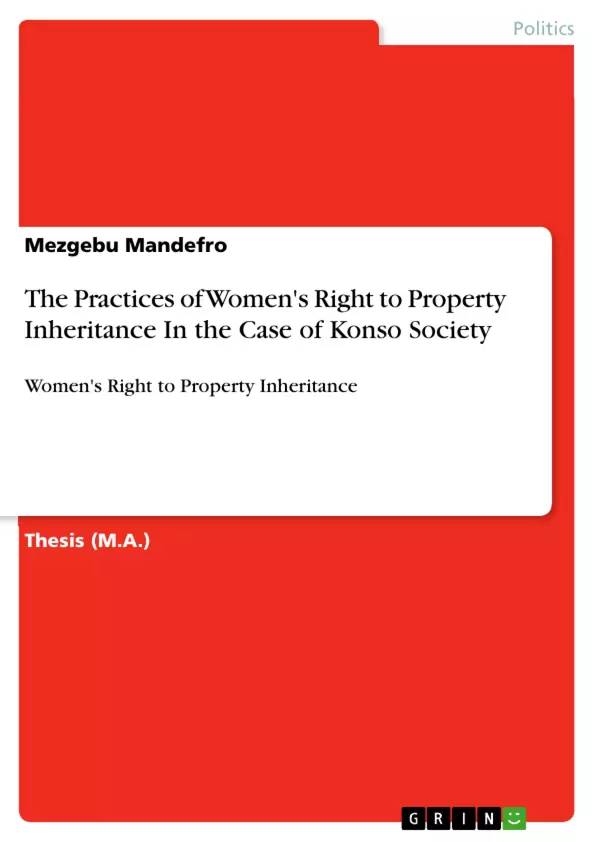This study examines the practices of Women’s right to property inheritance among the Konso society. It aims to identify various socio-cultural and economic hurdles accounted for women’s disinheritance of property, its impacts on their human rights and assess the effectiveness of both indigenous system and legal action to protect women’s right to property inheritance .Qualitative methodology is employed to conduct this study. FGD with clan heads, elders and selected women are conducted. Similarly, semi-structured interview with victim daughters and widows, judges and women’s affairs department officer is conducted. In-depth interview with KI and also review of inheritance cases from court are employed. The finding of the study reveals that traditional enforcements of inheritance rights either in testate or intestate are excluded women to enjoy their rights, whereas, the legal enforcements are better placed to assist women to secure their rights. The patrilineal and extended family system, perception of women as outsider to clan member, the son guardianship of family, perception of women cannot manage property, social stigma and distrust, and marital status and economic challenges are accounted for the discriminatory inheritance system that excludes women. Finding of the study indicates unequal treatment of men and women, violation of women’s property rights, adequate standard of living and violation of right to family unit and re-marry and violence against women are occurred as a result of discriminatory inheritance system. Finally the study forwards recommendation to realize women’s equal right to property inheritance through awareness creation and establishing link between court and local arbitrators.
Inhaltsverzeichnis (Table of Contents)
- Chapter 1: Introduction
- Chapter 2: Literature Review
- Chapter 3: Research Methodology
- Chapter 4: Data Presentation and Analysis
- Chapter 5: Conclusion and Recommendations
Zielsetzung und Themenschwerpunkte (Objectives and Key Themes)
This thesis aims to investigate the practices surrounding women's right to property inheritance within Konso society. It explores the complexities of customary laws, societal norms, and their impact on women's land ownership and economic empowerment.
- Women's property rights in Konso society
- The role of customary law in inheritance practices
- The impact of societal norms on women's land ownership
- The challenges faced by women in accessing property inheritance
- Recommendations for improving women's property rights
Zusammenfassung der Kapitel (Chapter Summaries)
Chapter 1: Introduction: This chapter introduces the research topic, providing background information on women's land rights in Ethiopia and specifically within the Konso community. It highlights the research problem, focusing on the discrepancies between legal frameworks and customary practices, and outlines the objectives and scope of the study. The chapter lays the groundwork for the subsequent chapters by establishing the context and significance of the research question.
Chapter 2: Literature Review: This chapter reviews existing literature on women's land rights, inheritance practices, and customary law, both globally and within the Ethiopian context. It explores various theoretical frameworks and previous research findings related to gender inequality and property ownership, setting the stage for a deeper understanding of the complexities of the Konso case study. The review synthesizes existing knowledge to identify gaps in the literature and establish the originality of the current research.
Chapter 3: Research Methodology: This chapter details the research design and methodology employed in the study. It explains the choice of a qualitative approach, the methods of data collection (likely interviews and potentially observations), and the techniques used for data analysis. The chapter justifies the chosen methods and addresses potential limitations, ensuring the transparency and rigor of the research process.
Chapter 4: Data Presentation and Analysis: This chapter presents and analyzes the data collected from the field research. It likely showcases the findings regarding women's experiences with property inheritance in the Konso community, illustrating these findings with specific examples and anecdotes from interviews. This chapter forms the core of the thesis, providing empirical evidence to support the arguments and conclusions.
Schlüsselwörter (Keywords)
Women's rights, property inheritance, customary law, Konso society, land ownership, gender inequality, Ethiopia, qualitative research, empowerment.
Häufig gestellte Fragen
Was ist der Inhalt dieses Dokuments?
Dieses Dokument ist eine umfassende Sprachvorschau, die einen Titel, ein Inhaltsverzeichnis, Ziele und Themenschwerpunkte, Kapitelzusammenfassungen und Schlüsselwörter enthält. Es dient dazu, einen Überblick über eine akademische Arbeit zu geben, die sich mit Frauenrechten, insbesondere dem Erbrecht, in der Konso-Gesellschaft beschäftigt.
Welche Kapitel werden in der Arbeit behandelt?
Die Arbeit umfasst die folgenden Kapitel:
- Kapitel 1: Einleitung
- Kapitel 2: Literaturübersicht
- Kapitel 3: Forschungsmethodik
- Kapitel 4: Datendarstellung und Analyse
- Kapitel 5: Schlussfolgerung und Empfehlungen
Was sind die Hauptziele und Themen der Arbeit?
Das Hauptziel der Arbeit ist die Untersuchung der Praktiken rund um das Erbrecht von Frauen in der Konso-Gesellschaft. Zu den wichtigsten Themen gehören:
- Frauenrechte in der Konso-Gesellschaft
- Die Rolle des Gewohnheitsrechts bei Erbschaftspraktiken
- Die Auswirkungen gesellschaftlicher Normen auf den Landbesitz von Frauen
- Die Herausforderungen für Frauen beim Zugang zum Erbe
- Empfehlungen zur Verbesserung der Eigentumsrechte von Frauen
Welche Forschungsmethodik wird in der Arbeit verwendet?
Die Arbeit verwendet eine qualitative Forschungsmethodik, wahrscheinlich unter Verwendung von Interviews und möglicherweise Beobachtungen. Die Datenerhebung und -analyse wird im Kapitel über die Forschungsmethodik detailliert beschrieben.
Welche Schlüsselwörter sind mit dieser Arbeit verbunden?
Zu den Schlüsselwörtern gehören: Frauenrechte, Erbrecht, Gewohnheitsrecht, Konso-Gesellschaft, Landbesitz, Geschlechterungleichheit, Äthiopien, qualitative Forschung, Empowerment.
Was wird im Kapitel "Datendarstellung und Analyse" behandelt?
Dieses Kapitel präsentiert und analysiert die Daten, die aus der Feldforschung gewonnen wurden. Es stellt wahrscheinlich die Erfahrungen von Frauen mit dem Erbrecht in der Konso-Gesellschaft dar, wobei diese Erkenntnisse durch spezifische Beispiele und Anekdoten aus Interviews veranschaulicht werden.
- Quote paper
- Mezgebu Mandefro (Author), 2012, The Practices of Women's Right to Property Inheritance In the Case of Konso Society, Munich, GRIN Verlag, https://www.grin.com/document/1550323



